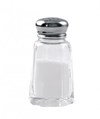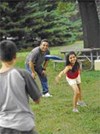One of the biggest secrets to healthy lifestyle success is to plan ahead. With these simple tips you’ll save time and cut down on the meal preparation stress in your daily life.
Posted 4/5/2014 by Eat Smart Play Hard

Posted 3/28/2014 by National Institutes of Health

A high-protein diet during middle age was associated with higher mortality in a new study. In adults over 65, however, a high-protein diet was linked to lower mortality.
Calorie restriction increases longevity in many animals. It’s not known, however, if restriction works by lowering calorie intake or by reducing the intake of protein or other nutrients. A team led by Dr. Valter Longo at the University of Southern California set out to explore the link between dietary protein and mortality. The study was funded in part by NIH’sNational Institute on Aging (NIA).
Posted 3/28/2014 by http://go4life.nia.nih.gov

At times, almost everyone can use a personal cheerleader for encouragement, inspiration, and even celebration when they successfully meet their goal. Cheering on a friend or family member who wants to be more physically active can be a great way to show your support—and it’s easy to do. Here are a few tips.
Posted 3/22/2014 by FDA

The FDA is proposing to update the Nutrition Facts label found on most food packages in the United States. The Nutrition Facts label, introduced 20 years ago, helps consumers make informed food choices and maintain healthy dietary practices. If adopted, the proposed changes would include the following. Click here to see FDA's webpage with more detailed information.
Posted 3/22/2014 by National Institute on Aging

Get moving! This 120-page guide describes the benefits of exercise and physical activity for older people. Learn how to set exercise goals and stick to them. Includes sample exercises for endurance, strength, balance, and flexibility and a list of resources.
Posted 3/15/2014 by www.nytimes.com link from WeCan!

For many obese adults, the die was cast by the time they were 5 years old. A major new study of more than 7,000 children has found that a third of children who were overweight in kindergarten were obese by eighth grade. And almost every child who was very obese remained that way.
Posted 3/15/2014 by www.extension.org

You probably already know that Americans need to eat more whole grains, low-fat milk, and fruits and vegetables. What you might not realize is that Americans tend to make poorer choices when eating away from home. For example, eating breakfast away from home usually means eating fewer whole-grains and dairy foods and more calories from saturated fat and added sugar. When people eat their dinner away from home they tend to eat fewer vegetables, especially the nutritious vegetables in the dark green and orange category.
Posted 3/8/2014 by American Heart Association

Getting too much added sugar in your diet could significantly increase your risk of dying from cardiovascular disease, according to a study published in January 2014.
According to the study published in JAMA: Internal Medicine, those who got 17 to 21 percent of calories from added sugar had a 38 percent high risk of dying from cardiovascular disease compared to those who consumed 8 percent of their calories from added sugar. The risk was more than double for those who consumed 21 percent or more of their calories from added sugar.
Posted 3/1/2014 by Cornell University, Evidence Based Living

Salt makes our food taste, well, delicious. It’s found in nearly everything we eat – from soups, to baked goods to meats and cheeses. Most adults consume between 6 and 12 grams of salt per day, even though health organizations recommend intake less than 5 grams per day.
Now a new, sweeping review published in the British Medical Journal finds that a high salt intake significantly increases a person’s risk of suffering heart disease or a stroke.
Posted 2/28/2014 by Eat Smart. Play Hard.

Here are some of the most common reasons people give for not being active and some helpful suggestions on how to overcome them:
| Previous Articles | More Articles |







